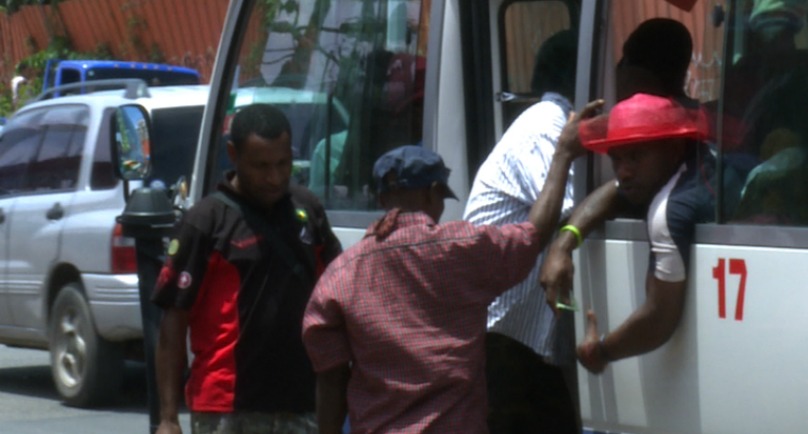By Scott Waide – EM TV News, Lae
Unless you understand the intricacies of PMV (Public Motor Vehicle) travel, getting on a PMV bus for interprovincial travel can be quite daunting.
The growth of the transport industry in Papua New Guinea has given rise to a tough market of unregulated informal employment at the PMV stops, along the highways and at towns and cities outside of Port Moresby.
‘Five Kina’ bus crews, so named because of their job of finding passengers for PMVs for a commission, flood the PMV stops. Their methods range from sweet-talking to in-your-face harassment of potential passengers.
With high unemployment, working as a five kina bus crew provides a much needed source of cash for young men looking for a legal means of earning an income. In Lae, Madang and the Highlands, it draws young men from all over the nearby villages and settlements.
It is an evolution in transport industry employment that occurred over 30 years.
Usually, the driver at the PMV stop collecting passengers is never the one who will take you to your destination. The actual driver is usually off taking that much needed nap and recovering from the 300 kilometre journey the night before.
“You have to look for a bus you know or people who know,” says one frequent traveller.
“The guy driving the bus and collecting passengers is not the bus driver.”
The growing number of bus owners has meant stiffer competition and those able to get all the seats in their PMVs filled are the first to depart. That competition has helped to keep the price of PMV travel down.
But it means bus owners have to struggle to maintain healthy profit margins when the roads are bad and people are hired to push PMVs bogged down on damaged roads.
“You have to remember,” says a bus crew member collecting PMV fares.
“Passengers can’t under pay. If they do we won’t be able to pay locals along the road to get us out if the vehicle becomes stuck.”
Along the highways, pulling out a PMV from a bog has also become a lucrative means of earning an income for people living along isolated sections of the Lae-Madang Highway, as well as in the Highlands region where government services are scarce.
Nearly every village has a rope or chain kept for PMVs that get stuck in the mud.
Each vehicle is charged between K50 and K100, depending on size and the effort taken to pull it out.
Along the Highlands Highway, the cost of PMV travel rose in February after locals began charging a ‘tax’ of K100 for every PMV crossing a damaged road section at Kol Wara in the Eastern Highlands. The justification was that the Works Department had cut a bypass into customary land without compensating landowners. Therefore, the cost was passed on to passengers.
Apart from the Motor Vehicle Registration, licencing, and traffic rules, nearly everything else including employment of commission seeking crews remains unregulated.
There are no specific laws governing other areas loosely associated with the transport service provision. For the government, it remains difficult to manage because many of those who make an income exist outside the perimeters of formal employment.


